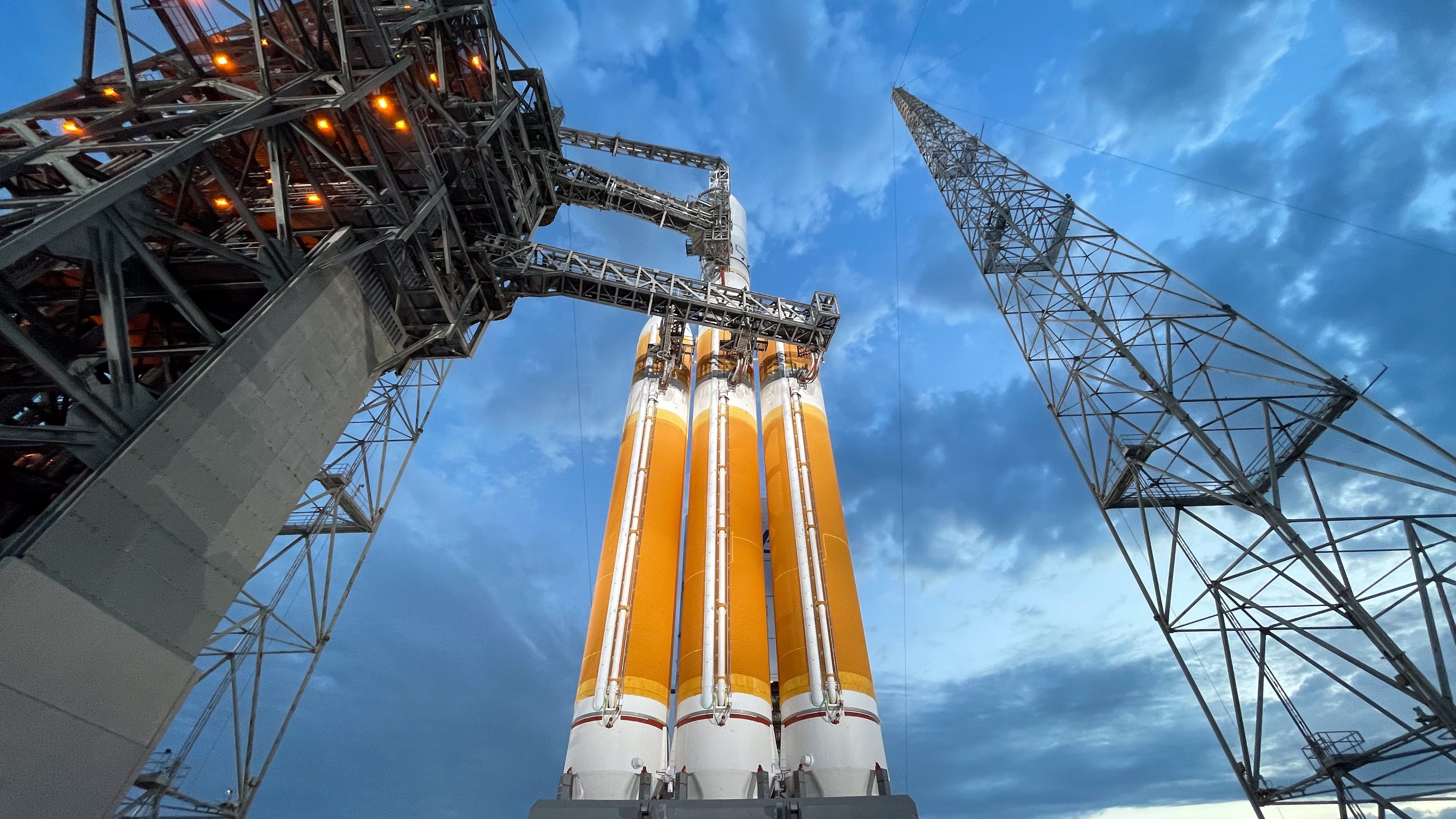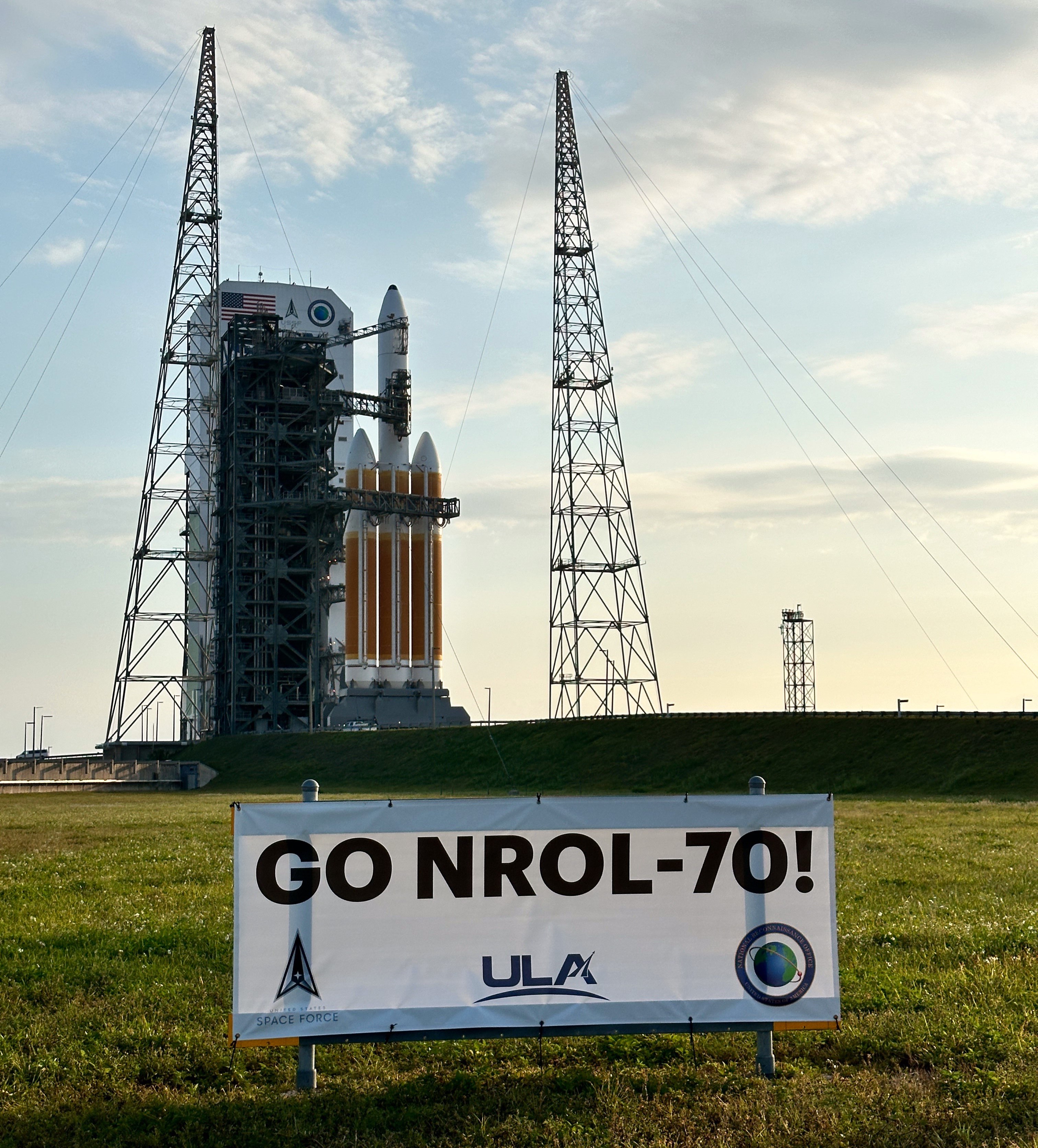Secretive Delta IV Heavy rocket launch postponed indefinitely
The final liftoff of a United Launch Alliance Delta IV Heavy rocket was postponed indefinitely following a last-minute nitrogen issue.

Get the world’s most fascinating discoveries delivered straight to your inbox.
You are now subscribed
Your newsletter sign-up was successful
Want to add more newsletters?

Delivered Daily
Daily Newsletter
Sign up for the latest discoveries, groundbreaking research and fascinating breakthroughs that impact you and the wider world direct to your inbox.

Once a week
Life's Little Mysteries
Feed your curiosity with an exclusive mystery every week, solved with science and delivered direct to your inbox before it's seen anywhere else.

Once a week
How It Works
Sign up to our free science & technology newsletter for your weekly fix of fascinating articles, quick quizzes, amazing images, and more

Delivered daily
Space.com Newsletter
Breaking space news, the latest updates on rocket launches, skywatching events and more!

Once a month
Watch This Space
Sign up to our monthly entertainment newsletter to keep up with all our coverage of the latest sci-fi and space movies, tv shows, games and books.

Once a week
Night Sky This Week
Discover this week's must-see night sky events, moon phases, and stunning astrophotos. Sign up for our skywatching newsletter and explore the universe with us!
Join the club
Get full access to premium articles, exclusive features and a growing list of member rewards.
UPDATE: The launch of the Delta IV Heavy rocket has been postponed indefinitely. According to a tweet from United Launch Alliance (ULA) posted on Thursday, an ongoing problem with a gaseous nitrogen pipeline has forced the team to scrub the mission and pick a new date. The statement reads:
"The team continues to troubleshoot the pipeline and more time is needed to instill confidence in the system. We will continue to work with our customer to confirm our next launch attempt and a new date will be provided upon resolution."
The launch was previosuly rescheduled to Friday (March 29) at 1:37 p.m. EDT, due to the issue. Here is the full statement issued by the United Launch Alliance:
"The launch of a United Launch Alliance Delta IV Heavy carrying the NROL-70 mission for the National Reconnaissance Office was scrubbed due to an issue with the gaseous nitrogen pipeline which provides pneumatic pressure to the launch vehicle systems. The team initiated operations to secure the vehicle. The launch is now planned for Fri., March 29 at 1:37 p.m. EDT."
The United Launch Alliance's (ULA) last Delta rocket is scheduled to launch tomorrow (March 29) at 1:37 p.m. ET (5:37 p.m. GMT) on a classified mission for the U.S. National Reconnaissance Office (NRO) — and you can watch it live right here.
The launch will end a 64-year run for the Delta rocket fleet, which was designed to lift large payloads into space. The Delta IV Heavy rocket, which is the 16th of its kind to launch since 2004, will carry a secret cargo as it lifts off one last time from Space Launch Complex-37 at Cape Canaveral Space Force Station in Florida.
The ULA has not disclosed the nature of the payload that is blasting off into space, but it likely consists of a sophisticated satellite, according to Live Science's sister site Space.com. The NRO is an agency within the U.S. Department of Defense tasked with designing and operating surveillance satellites, and it rarely makes the nature and purpose of its reconnaissance systems known to the public.
All we know about the current mission is its name, NROL-70, and when it is scheduled to lift off, which you can watch live on a ULA webcast, embedded below.
"The NROL-70 mission will strengthen the NRO's ability to provide a wide-range of timely intelligence information to national decision makers, warfighters, and intelligence analysts to protect the nation's vital interests and support humanitarian efforts worldwide," representatives of the ULA wrote in a mission statement.
Related: China will launch giant, reusable rockets next year to prep for human missions to the moon
It is uncertain whether the Delta rocket will actually take off at the newly announced time, as ground winds and cumulus clouds have created unfavorable conditions, already resulting in delays. The 45th Weather Squadron forecasts a 30% chance that the weather will settle down enough for launch on Thursday and a 60% chance of favorable conditions on Friday (March 29), according to Spaceflight Now.
Get the world’s most fascinating discoveries delivered straight to your inbox.
Ground winds are especially concerning, as there is a risk the rocket will be blown back against the launch tower, ULA president and CEO Tory Bruno said during a press conference.
"It depends on the angle of the wind," Bruno said. "We can launch through a pretty narrow moment in time. So, if the winds calm down, even for just a few minutes… then we'll launch through that opportunity."
The Delta IV Heavy rocket is not the only rocket that is reaching the end of its career, with ULA also planning to retire Atlas V. The space launch company is making way for its new Vulcan Centaur rocket, whose controversial first mission — sending Astrobotic's ill-fated Peregrine lunar lander moonward — launched in early January. Despite a successful launch, the Peregrine spacecraft suffered a fuel leak almost immediately, cutting short its mission and forcing it to crash back through Earth's atmosphere on Jan. 19.

Sascha is a U.K.-based staff writer at Live Science. She holds a bachelor’s degree in biology from the University of Southampton in England and a master’s degree in science communication from Imperial College London. Her work has appeared in The Guardian and the health website Zoe. Besides writing, she enjoys playing tennis, bread-making and browsing second-hand shops for hidden gems.
 Live Science Plus
Live Science Plus











